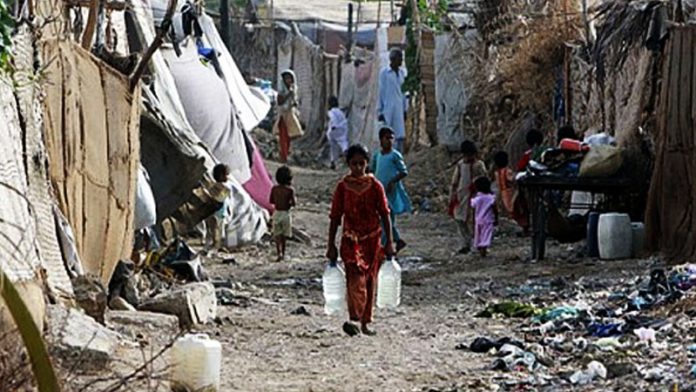Poverty in Pakistan surged by seven percentage points in 2024, reaching a rate of 25.3%, according to the World Bank’s report titled “Poverty Projections for Pakistan.”
This rise has pushed an estimated 13 million more people below the poverty line, painting a grim picture of the nation’s economic trajectory.
The report highlighted that since 2019, when 21.9% of the population lived below the national poverty line, the compounded impacts of the COVID-19 pandemic, devastating 2022 floods, and a worsening macroeconomic crisis have exacerbated poverty.
Record inflation has particularly hit poor households, pushing them deeper into financial distress. “Poor households face disproportionately higher welfare losses and get pushed deeper into poverty,” the report noted.
The World Bank utilized a microsimulation tool combining household survey data and high-frequency macroeconomic indicators to generate these findings.
It emphasized that the absence of a new household survey hinders the accurate evaluation of poverty trends and the effectiveness of policy interventions.
The report also underscored significant regional disparities in poverty levels. Balochistan remains the most affected province, with 70% of its population living below the poverty line.
Khyber Pakhtunkhwa (KP) recorded 48% of its population in poverty, while Sindh and Punjab reported rates of 45% and 30%, respectively.
Additionally, the Pakistan Institute of Development Economics (PIDE) corroborated the rising trend, noting that the national poverty rate climbed from 38.6% to 39.5% over the past five years.
The findings contradict the government’s 2024 claims of economic progress, which boasted controlled inflation and reduced commodity prices. The World Bank stressed that inflation, especially in food and energy sectors, has disproportionately affected lower-income households, further widening inequality.
It noted the importance of targeted social protection programs like the Benazir Income Support Programme (BISP) to mitigate the impact.
As Pakistan’s economic challenges mount, experts call for structural reforms, including equitable taxation on agriculture and property, as well as enhancing local governance.
The report concluded that while economic stability is crucial, addressing systemic inequalities is paramount for sustainable poverty alleviation.




